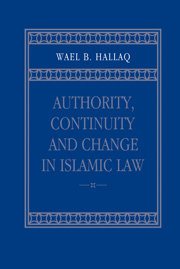Book contents
- Frontmatter
- Contents
- Preface
- 1 Juristic typologies: a framework for enquiry
- 2 Early ijtihād and the later construction of authority
- 3 The rise and augmentation of school authority
- 4 Taqlīd: authority, hermeneutics, and function
- 5 Operative terminology and the dynamics of legal doctrine
- 6 The jurisconsult, the author–jurist, and legal change
- Summary and conclusions
- Bibliography
- Index
1 - Juristic typologies: a framework for enquiry
Published online by Cambridge University Press: 27 July 2009
- Frontmatter
- Contents
- Preface
- 1 Juristic typologies: a framework for enquiry
- 2 Early ijtihād and the later construction of authority
- 3 The rise and augmentation of school authority
- 4 Taqlīd: authority, hermeneutics, and function
- 5 Operative terminology and the dynamics of legal doctrine
- 6 The jurisconsult, the author–jurist, and legal change
- Summary and conclusions
- Bibliography
- Index
Summary
A juristic typology is a form of discourse that reduces the community of legal specialists into manageable, formal categories, taking into consideration the entire historical and synchronic range of that community's juristic activities and functions. One of the fundamental characteristics of a typology is the elaboration of a structure of authority in which all the elements making up the typology are linked to each other, hierarchically or otherwise, by relationships of one type or another. The synchronic and diachronic ranges of a typology provide a synopsis of the constitutive elements operating within a historical legal tradition and within a living community of jurists. It also permits a panoramic view of the transmission of authority across types, of the limits on legal hermeneutics in each type, and of the sorts of relationships that are imposed by the interplay of authority and hermeneutics.
The evolution of the notion of the typology as a theoretical construct or conceptual model presupposes a conscious articulation of the elements that constitute them. To put it tautologically, since typologies purport to describe certain realities, these realities must, logically and historically speaking, predate any attempt at typification. And since Islamic juristic typologies presuppose, by virtue of their hermeneutical constitution, loyalty to the madhhab or legal school, then it is expected that no typology can be possible without positing a school structure.
- Type
- Chapter
- Information
- Authority, Continuity and Change in Islamic Law , pp. 1 - 23Publisher: Cambridge University PressPrint publication year: 2001



